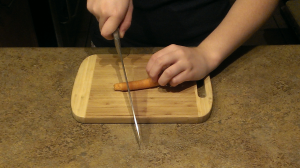Summer is right around the corner, and the long break is always a great time to sharpen your skills in the kitchen. However, one should always keep safety in mind when working in the kitchen.
It should come as no surprise that most household accidents occur in the kitchen: the room is filled with cool gadgets that could double as medieval torture devices. In addition to that there are heat sources abound and sharp edges everywhere, turning your lovely little kitchen into a minefield of mishaps waiting to happen. Thankfully most accidents can be prevented with proper kitchen safety.
Much of kitchen safety consists of miscellaneous reminders. When in the kitchen, keep your counter space neat and clean: clutter is the enemy of safety, whether it be jumbled electrical wires or raw chicken juices. Wear appropriate clothing to keep out of harms way, and replace broken appliances.


Learn to use a knife properly (unless you would like to scour the kitchen floor for your missing ring…finger). Keep your fingers pulled back, away from the blade, when chopping, and go at a speed that you’re comfortable at. Use the proper blade size and type for the job (serrated for thick-skinned citrus fruits, straight for meats, etc) and keep your knives sharpened. A dull blade slips often, making it more dangerous than a sharp blade. Never use a knife with a slippery or greasy handle, either. Always use different knives and boards between meats to eliminate cross contamination, which brings me to the next topic of…
Foodborne illnesses. I won’t focus on this as much, but it remains a very real danger. Cook and store your foods properly, and always follow the sage advice of: “if in doubt, throw it out.” (Check out these government guides on cooking temperatures and food storage for more detailed information.) Although foodborne illnesses typically result in a few miserable days of bathroom confinement, they can also be fatal or cause other life-long diseases, so take all precautionary measures seriously.
Another huge danger in the kitchen is hot oil. Ever heard the saying that “oil and water just don’t mix”? That’s only amplified by heat. It is incredibly unpleasant to have hot oil burn you (burns are generally painful, believe it or not). In the event that you need to wash an item before adding it to the oil (e.g., washing vegetables before stir frying them) be sure to pat it dry after washing it. And should you end up with a grease fire, use a lid to smother the fire. For the love of all that is holy, do not throw water on the fire. All you’ll get in return is a huge ball of infernal flames spewing oil at you with the fury of a thousand spitting cobras. For more information, click here for the National Fire Protection Association’s tips on dealing with kitchen fires.
Besides oil-related incidents, regular burns and scaldings in the kitchen are common, but can be prevented by using oven mitts. Keep your head turned away when initially opening a hot oven (a steam burn to the face is all too possible, and all too painful) and keep the handles of saucepans facing inwards on the stove. Despite all this, accidents are bound to happen (I myself have been the victim of grabbing a sheet of fresh croutons straight from a 350F oven without an oven mitt), so keep the basics of minor burn care in mind: cool under running water, cover with a bandage, and protect with an antibiotic ointment. Watch for signs of infection. Seek medical help for major burns or infected burns.
All that said, cooking is actually quite a fun hobby and can be very relaxing. Most safety is really just common sense, so keep your head straight and remember to enjoy yourself.







